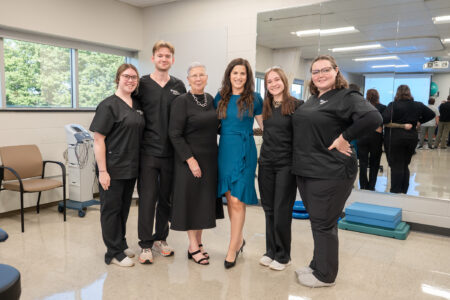It’s that time of year again — Is it a virus or is it environmental?

With the return of students to the classroom, there is also a return to runny noses, teary eyes, coughing and generally feeling unwell. That is almost a certainty.
But what is not a certainty is how to know if those symptoms could be the sign of something more serious that requires medical intervention.
If other family members are experiencing symptoms of something like a typical head cold, but without a fever, then it’s a good bet that it could be treated with an over-the-counter medication and, according to Dr. Nathaniel David Hare, UPMC Allergy and Immunology, you “don’t necessarily need to take them to the doctor.”
But for anything that’s beyond those nasal type symptoms, eye symptoms, things like that, if they’re having more extensive symptoms or rashes or trouble breathing, Hare suggested that they be evaluated.
It’s hard to know, though, this time of year, because everywhere there are still pollen-producing plants sending out those irritants.
“There are the main outdoor ones at this point. You’ve got weed pollens and wheat pollens which tend to run through the first hard frost. So generally they’re, the end of September into the first week of October. The first hard frost is kind of when they start settling down,” he said. “Same thing outside. Molds are an issue this time of year with harvest season, and they can run through kind of the first hard frost, if there’s no snow cover. They never quite completely disappear, but they’re at a lower level,” he said.
There are also seasonal allergens indoors.
“Occasionally people have what is called a multi-colored Asian lady beetle, but basically it’s a type of invasive ladybug species that in some older houses, will go invade the house, and if you get hundreds or thousands in your house, occasionally, people can become allergic to them,” he explained.
“It’s an unusual seasonal fall indoor allergen, since the ladybugs come into the house that time of year. But for most people, they don’t get that issue with their houses, it won’t usually be an issue,” he added.
Hare also cautioned people to be aware of insect stings before the first hard frost occurs. Honey bees, yellow jackets, hornets, wasps and things like that tend to be more active this time of year because the weather is becoming cooler.
Allergens can also be a problem once people start hunkering down for the winter, even though allergies tend to be less of an issue when a house is closed up.
“The outside allergies are probably less of an issue at that point, and probably done for the year, but if you’re allergic to stuff that’s indoors, like dust mites or animal danders that can sometimes get worse when you close up the house for the winter because you’re spending more time indoors,” he said.
It’s usually easy to know that these symptoms are caused by an allergic reaction and not by a virus.
“It’s an easy one, if you have a fever, you know, you’re not dealing with allergies,” Hare said.
“It’s harder sometimes, if you have a virus without a fever — it’s mainly just eyes and nose, like itchy, sneezy, stuffy, runny type stuff, that’s a little bit harder to tell. If it’s gone on more than probably a week or so, the chances of it being an allergy are probably a little bit higher, especially if nobody else in the family is getting it,” he said.
For allergies, basically the treatment is dictated by the symptom. If your eyes are affected, Hare suggested eye drops or some type of allergy pill in the case of older children or adults, or a liquid allergy medicine for children. For nasal symptoms, an allergy medicine or a nose spray is appropriate.
For people who chronically suffer from allergies, the same treatments are appropriate, but if that doesn’t work, Hare said, “you can see an allergy doctor, get allergy testing. And if it’s appropriate, you have the option of doing allergy shots to retrain your immune system, and they work for about 80% of people — they average about a 50 to 70% drop in symptoms.”
If you want to enjoy the last days of summer but suffer from allergies, Hare suggested going out later in the day when the pollen counts are lower.
“Otherwise you’re looking at, can you control symptoms with medication, or do you need to do allergy shots at that point if it’s something outdoors? The other thing to keep in mind is, during this time of year when there’s outdoor allergies present, if you’re using window air conditioning units, the filters on those aren’t good enough, the pollen is too small,” he said, explaining that a HEPA filter would alleviate that problem.




